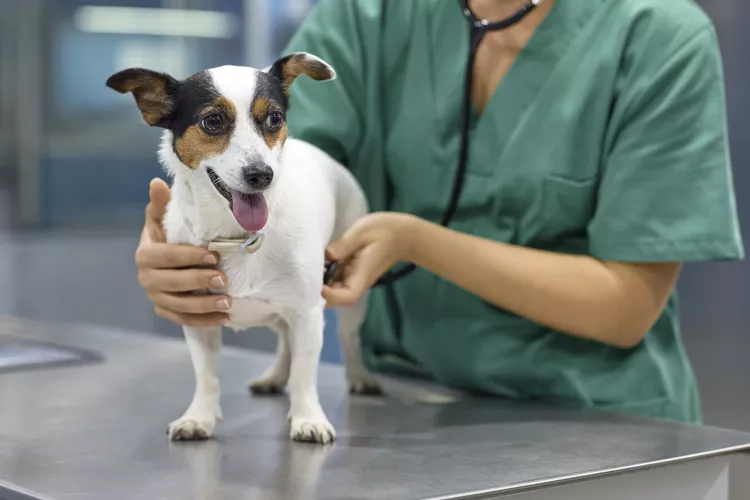
Does your dog have bronchitis? This inflammatory condition of the lower airway causes a dog to cough, gag, run a fever, and feel generally unwell. Treatment of bronchitis often depends on the cause of the inflammation, which may be a bacterial or fungal infection. Without treatment of the underlying problem, bronchitis may become a chronic condition.
Bronchitis is a term that describes inflammation of the bronchial airways (the lower airways inside the lungs). Because it almost always corresponds with inflammation of the trachea (windpipe), it is sometimes called tracheobronchitis. Bronchitis may also cause inflammation within the lungs. There is generally an acute condition, such as an infection, that triggers bronchial inflammation, but the condition can become chronic due to untreated irritation of the respiratory tissues.
Several signs may accompany bronchitis in dogs, some more common than others. Signs generally become more severe as bronchitis gets worse.
Coughing is by far the most common sign of bronchitis in dogs. Signs like sneezing, nasal discharge, and runny eyes often occur when the dog also has an upper respiratory infection. A fever often indicates infection as well.
When bronchitis is moderate to severe, it can make the dog lethargic and intolerant to exercise. Shortness of breath or rapid breathing may also occur.
Appetite is often decreased when a dog feels unwell. Upper respiratory diseases can impact the dog's sense of smell, making food even less appealing. Not eating makes a dog recover more slowly from illness, leading to a cycle of disease progression.
Bronchitis may be acute or chronic. A dog that is coughing for reasons other than bronchitis can develop bronchitis due to the inflammation coughing creates in the airway. This is often the case with dogs that cough due to preexisting airway disease or exposure to inhaled toxins like smoke or chemicals.
Multiple factors can lead to bronchitis in dogs, including:
Chronic bronchitis is suspected when a dog has a persistent cough that continues for two or more months and cannot be attributed to another disease, especially if x-rays show signs of inflammation in the lower airways.
A definitive diagnosis is obtained through a procedure known as a transtracheal wash, or bronchoalveolar lavage, where the dog is sedated and samples of fluid are collected from the lungs to evaluate under the microscope.
Your veterinarian will recommend the appropriate course of treatment for your dog's bronchitis. In acute cases, treatment may only be needed short-term, until the dog recovers. Chronic bronchitis may require ongoing treatment with frequent adjustment of medications.
Never use over-the-counter medications unless specifically recommended by your vet. They may interact with other medications or impede recovery.
Antibiotics may be prescribed if an infection is suspected or needs to be ruled out.
Corticosteroids are often used to reduce swelling and inflammation in the airway, minimizing coughing. These medications can be given systemically (by mouth or injection) or, for long-term management, an inhaler might be prescribed.
Cough suppressants can reduce coughing and make the dog more comfortable. Because the coughing itself can increase airway inflammation, a reduction in coughing can help a dog recover from bronchitis. On the other hand, too much suppression of coughing may make it difficult for the dog to expel mucus from the airway. Vets often prescribe cough suppressants such as hydrocodone and butorphanol.
Bronchodilators can relax the muscles in the airway, possibly helping air pass more freely. These medications may be injected, administered orally, or given as an inhalant. Common drugs include albuterol, terbutaline, and theophylline.
Nebulization and coupage can help thin out and loosen up secretions in the airway. Nebulization involves the use of a machine that puts out a fine mist of saline that the dog can breathe in. It may or may not have medications added to it. Coupage is often done along with nebulization. It involves patting and massaging the chest to break up congestion and mucus. Your vet's office can show you how to perform nebulization and coupage at home if necessary.
Bronchitis may come on suddenly and improve with treatment if it occurs as a secondary problem to an infectious disease or other disorder of the airways. In many cases, bronchitis is a chronic, long-term condition due to allergies or hypersensitivity of the airways.
Depending on the cause of your dog's bronchitis, it may or may not have been preventable. Fortunately, there are ways to minimize your dog's risk of developing bronchitis. You can also take measurements to reduce flare-ups of chronic bronchitis.
Any dog can develop bronchitis, including the chronic form. However, small dog breeds appear to be at a greater risk for chronic bronchitis. If your dog is coughing for more than a few days, be sure to visit your vet for help.

10 Obscure, Little-known Canine Facts in Honor of National Dog Day
With National Dog Day upon us, it's time to celebrate everything about our favorite pets—even the weirder stuff. Here are 10 obscure facts about dogs you probably didn't know.
Exploring the Different Types of Pet-Friendly Beaches
Are you looking for pet-friendly beaches? Learn about the different types of pet-friendly beaches, their locations, and tips for visiting them with your pet.
Toxic Chemicals & Household Items That Can Poison Dogs
There are many things in and around your home that can endanger your dog. Learn which chemicals and household items can poisin your dog.
Bronchitis in Dogs
Is your dog coughing and feeling unwell? It could be due to respiratory inflammation called bronchitis. Learn the causes, treatment, and prevention.
Choking in Dogs
A dog can occasionally swallow something incorrectly and start choking. Find out how you can tell if your dog is choking and what you can do about it.
Why Does My Dog Smell So Bad?
Does your dog smell? Find out what could be causing these unpleasant odors and if it's something that needs more than just a bath to fix.
Is Rosemary Safe for Dogs?
Rosemary is used both for cooking and as a supplement with many reported health benefits in people, so you may be wondering if it is safe to give to your dog. Rosemary is considered non-toxic for dogs but with some caveats.
Can Dogs Eat Blueberries?
Dogs can safely eat blueberries. Blueberries are packed with nutrients and can be a great addition to your dog's diet when fed in moderation. Learn more about the benefits, risks, how to incorporate blueberries into their diet, and other fruits dogs can eat.
Dog Food Basics
Are you feeding your dog the best way possible? Check out these dog feeding tips to keep your dog healthy and happy.
Swedish Vallhund: Dog Breed Characteristics & Care
The Swedish vallhund makes for a high-energy and affectionate companion. Learn about the breed's history, health, exercise needs, and more.
Becoming a Show Dog: Getting Started
Do you have the perfect puppy? Have you considered showing her in a dog show? There's much more to showing than showing up! Here's how to get started.
How to Care for a Hairless Cat
Hairless cats make great pets but they aren't without their own challenges and requirements. Read on to learn how to best care for your furless feline.
British Shorthair: Breed Profile, Characteristics & Care
The British Shorthair is a calm, affectionate cat that looks and feels like a plush teddy bear. Here's what you need to know about this popular breed, including appearance, temperament, health, and care.
Tonkinese: Cat Breed Profile, Characteristics & Care
The Tonkinese cat is a perfect mix of the Siamese and Burmese—smart, sociable, and sweet. Learn about the Tonkinese breed.
How to Stop Your Cat From Chewing Electrical Cords
Cats are known to pounce and attack inanimate objects, like electrical cords. Learn how to prevent your cat from ambushing objects that may harm it.
How to Stop Aggression in Kittens
Kittens may show aggressive behavior for several reasons. Sometimes their play gets too aggressive while other times the kitten is afraid or upset. Learn how to spot and curb aggression in kittens.
46 Egyptian Cat Names
Whether inspired by notable Egyptian deities, locales, or pharaohs, Egyptian cat names can bring out the divinity of your noble feline companion.
How to Tell If a Kitten is a Boy or a Girl
If you're wondering whether your new kitten is a boy or a girl, here are three ways to help determine the sex of your cat.
Signs Your Cat Is Aging and When to See the Vet
Expect some changes when your cat ages. Learn to differentiate between normal and potential medical problems for your elderly cat.
Coronavirus in Cats
Feline coronavirus (FCoV) rarely harms cats but can lead to another life-threatening illness. Learn the causes, treatment, and prevention.